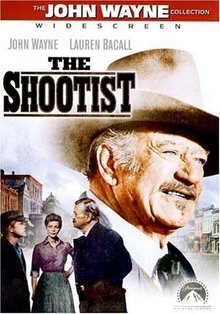| I have some more movies in mind that will allow me to continue this Friday series, but this week’s movie was the last one I presented to a class of junior high and senior high school boys. I chose The Shootist (1976) as the final movie not just for the character issues, which we’d pretty much covered already in other movies, but for the subtleties and shadings of character and the way a movie or story can manipulate our emotions and get us to identify with a “hero” who might not be all that heroic when you look really closely. |  |
This is not to bad-mouth John Wayne at all, here appearing in his final movie, or even the character he played. Fittingly, this is the story of a famous but terminally ill aging gunfighter (or “shootist”) trying to find peace in his final days. The point I was trying to get across to the boys, however, is how easily we look for a “good” guy in a story and identify with him – even if it’s only because he’s “less bad” than others.
The movie features a great cast with Wayne, Jimmy Stewart, Lauren Bacall, Henry Morgan, Richard Boone and Ron Howard as a fatherless and impressionable young man. Howard narrates the opening sequence of the movie, a flash back of gunfights featuring the infamous John Bernard (JB) Books which were, cleverly, scenes lifted from earlier John Wayne movies. When Books rides into Carson City, Nevada in 1901 he suspects he’s dying and is looking to lie low and pass away in obscurity. After his doctor friend (Stewart) confirms the diagnosis, however, word gets out in the town that they have a “celebrity” in their midst and many people start angling for a way to make a name or some money for themselves at Books’ expense. In the process he meets and eventually befriends the widow (Bacall) running the boarding house where he stays and her son (Howard). In interludes with this broken family Books gains a small taste of the life he might have had as a husband and father if he hadn’t followed the path his life took instead.
There were three things I wanted the boys to get out of the movie. One was the way Howard’s character, young Gillom, attempted to act more “manly” by swearing and drinking and otherwise carrying on as he thought men do because he didn’t have a model in his life. Another lesson was in the way Gillom’s mother, a staunch Christian who deplored Books’ lifestyle and history, came to see the “Christian” way to act toward someone who is suffering. The main point, however, was the code Books emphatically claimed that he lived by — “I won’t be wronged, I won’t be insulted, I won’t be laid a hand on…I don’t do these things to others, and I expect the same from them” — and how he regularly broke that code without seeing the irony in doing so.
Points to Ponder:
- Does your life make your reputation, or does your reputation make your life?
- The influences (or lack of influences) that shape our lives.
- The consequences and significance of decisions we make.
- Society’s expectations and exploitation of heroes.
- Is being good, good enough?
Some questions you might want to be able to answer:
- What was Books’ personal code that he explained to Gillom? Did he live up to it?
- What were Mrs. Rogers’ personal codes? How did her codes come into conflict with each other?
- How did Gillom try to make himself appear manly? What events in his life might explain his behavior?
- Was Books a good man or a bad man? What qualities did he have that were admirable? What qualities did he have that were not?
- What price did Books pay for his way of life? (What things did he give up, or miss out on?)
- Did Books have faith? Was it sufficient to get him into Heaven?
Great Quote:
JB: “Damn!”
Bond: “John Bernard, you swear to much.”
JB: “The hell I do!”
As I said, I have a few more movies in mind that I think portray admirable character qualities and motives and are useful examples for young people and I hope to continue this series and format here. If you have a favorite movie that fits this profile and objective by all means leave a comment or send me an email; I’d be happy to consider watching the movie and including it here at some point.
In a future, separate, post I’ll describe the results of the class and the impact, if any, it had on the young men who participated.












Never quite understood the difference between a Shooter and a Shootist…
Steven Seagal IS The Shootist! (sorry…)